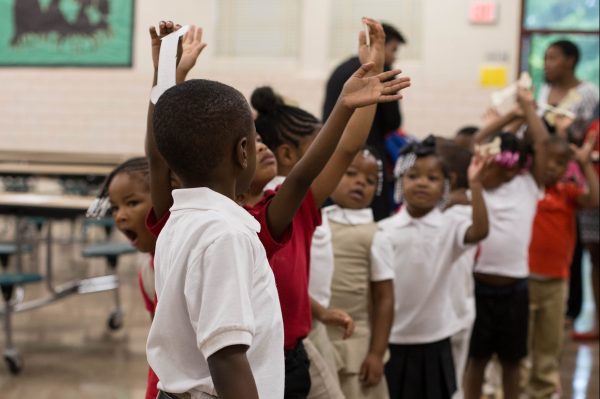Child Care Advocates Hope Biden’s Plan Can Help Fix A Broken System

The American Families Plan, proposed by President Joe Biden this week, includes free preschool for all 3 and 4-year-olds.
Johnathon Kelso / WABE
The new American Families Plan proposed by President Joe Biden this week would make preschool free for all three and 4-year-olds in the U.S. The plan budgets $225 billion for child care over 10 years. Some early education advocates are cautiously optimistic the plan could lead to significant changes.
A Broken System
Experts agree the COVID-19 pandemic revealed gaps in U.S. child care that have existed for years.
“You really couldn’t get away from the fact over the course of the past year how essential child care is to us as a country and is to families,” said Sarah Rittling, Executive Director of the First Five Years Fund, a non-profit focused on increasing child care access.
In addition to free preschool, Biden’s proposal would subsidize child care for younger children. For low-income families, it would be free.
Pam Tatum, President and CEO of Georgia-based non-profit Quality Care for Children says a lot of Georgia families would benefit from the plan’s subsidies, which would essentially act like vouchers.
“The average cost of child care in Fulton County, for example, is about $8,500 [a year],” she said. “If you have an infant, you can easily spend $10 to $12,000 a year. So that’s a big burden on families. In fact, it’s oftentimes more than they pay for housing.”
Tatum likes the plan but has some concerns. For one, it would require centers to pay workers a minimum wage of $15 an hour.
“In Georgia right now, the average is about $11 [an hour],” Tatum said. “So to increase the wages for child care workers would put many of them out of business. They simply can’t afford it.”
She’s hopeful that some supplements included in the plan would help.
“Child care fees are usually determined by what a parent can afford to pay,” Tatum said. “So if you’re in a low-income neighborhood, parents can’t pay much. So as a child care provider, you can’t pay your workforce much.”
Research shows students who attend high-quality preschool programs are more likely to graduate from high school and college. Studies show they’re also more likely to be consistently employed and have higher monthly earnings than their peers who didn’t attend such programs.

The Great Unknown
Because Biden’s plan is new, it’s hard to know how it will work if implemented. The proposal says preschool teachers who are state-certified would be paid the same rate as public kindergarten teachers.
“Equity is also always an issue when you start rolling out new policies and new programs,” Pam Tatum said. “So how will we ensure that the people who were in the child care workforce right now have access to the support to get those degrees and get those credentials?”
Despite possible unknown hurdles, though, Tatum is optimistic about the proposal.
“It’s really good,” she said. “There are a lot of details to work out, but it is a really solid plan.”
Sarah Rittling is also hopeful the plan’s investment in early education will help bring about change in an industry that struggled with equity even before the pandemic.
“I sure hope we can make a dent in what we’re facing out there in this country,” Rittling said. “I’d hope that at some point soon, we see that we’ve made some progress building from where we are, building from what we know, building on and in partnership with where states and communities are, and that we will see a dent in it.”
The American Families Plan, which also includes initiatives like paid family leave and free community college, is just an idea right now. Once it’s introduced to Congress, it could change a lot as it moves through the lawmaking process. Meanwhile, lawmakers on Capitol Hill, like Sen. Josh Hawley (R-Mo.) and Sen. Elizabeth Warren (D-Mass.) have introduced their own bills aimed at helping families afford child care.








